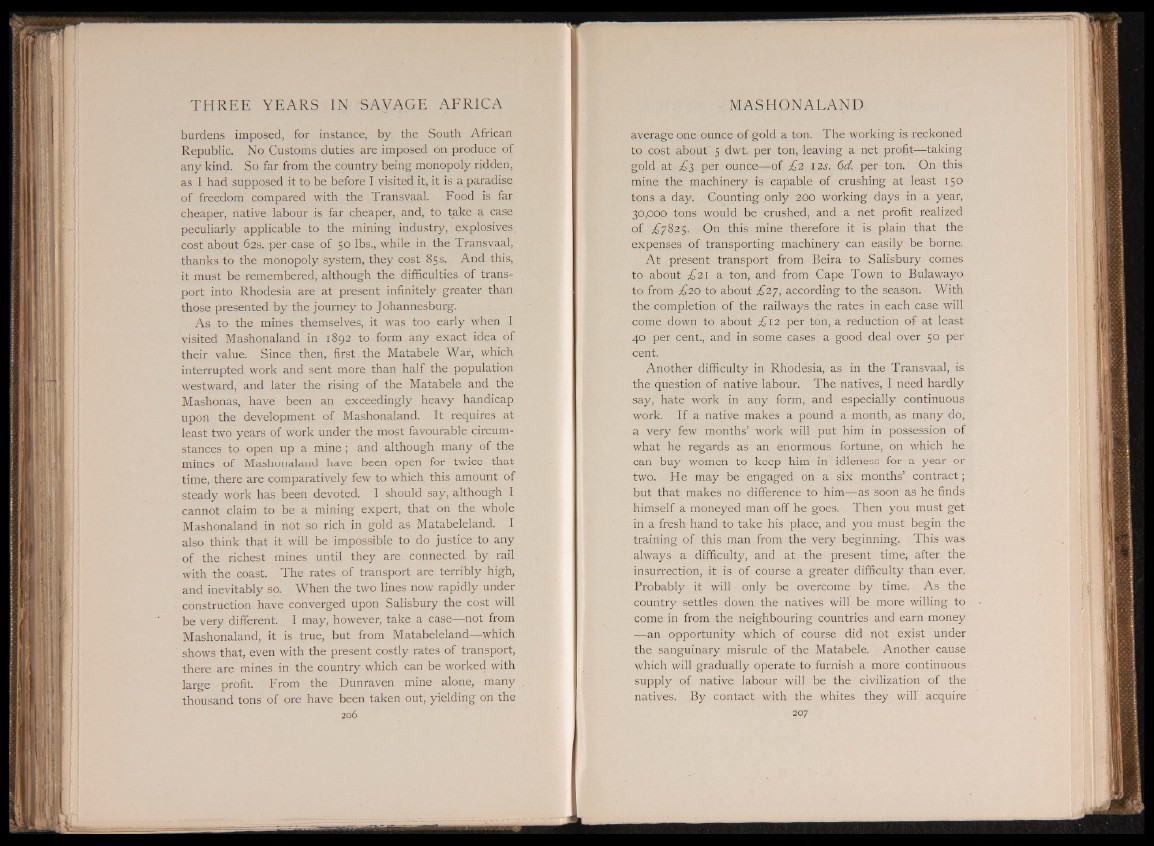
burdens imposed, for instance, by the South African
Republic. No Customs duties are imposed on produce of
any kind. So far from the country being monopoly ridden,
as I had supposed it to be before I visited it, it is a paradise
of freedom compared with the Transvaal. Food is far
cheaper, native labour is far cheaper, and, to take a case
peculiarly applicable to the mining industry, explosives,
cost about 62s. per case of 50 lbs., while in the Transvaal,
thanks to the monopoly system, they cost 85 s. And this,
it must be remembered, although the difficulties of transport
into Rhodesia are at present infinitely greater than
those presented by the journey to Johannesburg.
As to the mines themselves, it was too early when I
visited Mashonaland in 1892 to form arty exact idea of
their value. Since then, first the Matabele War, which
interrupted work and sent more than half the population
westward, and later the rising of the Matabele and the
Mashonas, have been an exceedingly heavy handicap
upon the development of Mashonaland. It requires at
least two years of work under the most favourable circumstances
to open up a mine ; and although many of the
mines of Mashonaland have been open for twice that
time, there are comparatively few to which this amount of
steady work has been devoted. I should say, although I
cannot claim to be a mining expert, that on the whole
Mashonaland in not so rich in gold as Matabeleland. I
also think that it will be impossible to do justice to any
of the richest mines until they are connected by rail
with the coast. The rates of transport are terribly high,
and inevitably so. When the two lines now rapidly under
construction have converged upon Salisbury the cost will
be very different. I may, however, take a case—not from
Mashonaland, it is true, but from Matabeleland—which
shows that, even with the present costly rates of transport,
there are mines in the country which can be worked with
large profit. From the Dunraven mine alone, many
thousand tons of ore have been taken out, yielding on the
206
average one ounce of gold a ton. The working is reckoned
to cost about 5 dwt. per ton, leaving a net profit—taking
gold at £3 per ounce—of £2 12s. 6d per ton. On this
mine the machinery is capable of crushing at least 150
tons a day. Counting only 200 working days in a year,
30,000 tons would be crushed, and a net profit realized
of £7825. On this mine therefore it is plain that the
expenses of transporting machinery can easily be borne.
At present transport from Beira to Salisbury comes
to about £ 2 1 a ton, and from Cape Town to Bulawayo
to from £20 to about £27, according to the season. With
the completion of the railways the rates in each case will
come down to about £ 12 per ton, a reduction of at least
40 per cent., and in some cases a good deal over 50 per
cent.
Another difficulty in Rhodesia, as in the Transvaal, is
the question of native labour. The natives, I need hardly
say, hate work in any form, and especially continuous
work. If a native makes a pound a month, as many do,
a very few months’ work will put him in possession of
what he regards as an enormous fortune, on which he
can buy women to keep him in idleness for a year or
two. He may be engaged on a six months’ contract;
but that makes no difference to him—as soon as he finds
himself a moneyed man off he goes. Then you must get
in a fresh hand to take his place, and you must begin the
training of this man from the very beginning. This was
always a difficulty, and at the present time, after the
insurrection, it is of course a greater difficulty than ever.
Probably it will only be overcome by time. As the
country settles down the natives will be more willing to
come in from the neighbouring countries and earn money
—an opportunity which of course did not exist under
the sanguinary misrule of the Matabele. Another cause
which will gradually operate to furnish a more continuous
supply of native labour will be the civilization of the
natives. By contact with the whites they will acquire
207